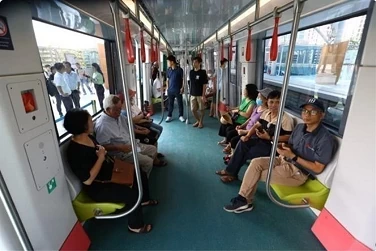
Hanoi speeds up process to 'green' public transport: Hanoi Railway
Latest
 |
| Passengers use the 8.5-km elevated section of the Nhon-Hanoi Station metro line in the first day of commercial operation on August 8. (Source: VNA) |
According to General Director of Hanoi Railway Co. Ltd. Vu Hong Truong, the Nhon - Hanoi Station metro service has attracted over 393,000 passengers in its first week of operation.
To put this in perspective, this was 2.3 times the number of people using the Cat Linh – Ha Dong line, also in Hanoi, during the same period.Between August 8 and 15, trains made 200 trips daily on the new route.
The number of passengers soared to 115,000 on August 11.
The Cat Linh–Ha Dong line conducted 930 trips to carry over 165,000 passengers during its first week of operation three years ago.
Meanwhile, a recent survey found that 20% of Cat Linh-Ha Dong metro service users who are also car owners said that they stop driving to use the metro services.
That is an evidence for the increasing interest of people to green transport, Truong said.
According to the official, public passenger transport has three development stages.
In the first stage, it’s supposed to serve people who have no means of transport. In the second stage, it competes with personal vehicles.
Currently, urban railways in Hanoi have gone through the two first stages and are aiming to become popular.
Every 1,000,000 hours of travel by urban railways will help reduce 100 tonnes of gas emissions, and bring a value of about 30 billion VND (1.2 million USD), Truong said.
Thai Ho Phuong, Director of the Hanoi Traffic Management and Operation Centre, said that the National Assembly has passed the amended Law on the Capital, in which, there are regulations on environmental protection and fossil energy conversion.
Hanoi is the first locality in Vietnam to issue a resolution to implement the Prime Minister’s decision on green energy transition programme by 2030. Accordingly, the city plans to have 50% of its vehicles run on electricity, and the other 50% turn into gas-powered vehicles during this period. In 2024, the city gives priority to electric vehicles.
With ten green bus routes operating in the city, Hanoi has reduced emissions by 36,500 tonnes of CO2, equivalent to planting 1.68 million trees.
Currently, Hanoi has "green" buses, "green" urban railways and subsidies for people to go green, Phuong said, emphasising that the Government, the city and businesses are also actively participating in the capital's green transition process.
















